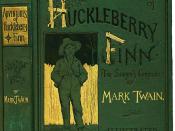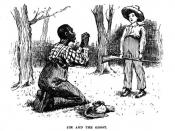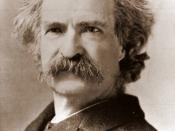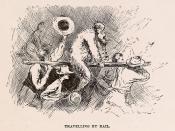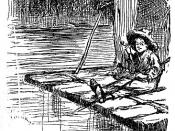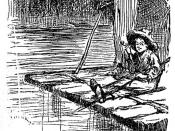Phil Cook Period 1 3/8/01 Prompt: 2 Go to Hell? Mark Twain stepped boldly towards realism when he wrote his classic novel, Adventures of Huckleberry Finn. The surprisingly more impressive sequel to Adventures of Tom Sawyer, Adventures of Huckleberry Finn uses many dialects that give the book its realistic edge. The story uses many literary devices to express Twain's feelings on subjects such as slavery, and life in the south. The device he uses most is dramatic irony. By having the tale told by a young child (Huck Finn) who at times doesn't understand what he is talking about, gives the reader an interesting view of the boy's actions. Thus, when Huck believes he is betraying or helping someone, he may be doing the complete opposite. Huck's decision to "go to hell"ÃÂ is ironic because the deeds he commits to bring himself to such a drastic statement are in the eyes of most people more than good, but heroic.
He also idolizes Tom Sawyer whose actions are the opposite of heroic.
Huck sees Tom Sawyer as a perfect person who can do no wrong, but in fact almost everything he does is evil. Huck decides he is going to free Jim, and he finds Tom and tells Tom of his plans. When Huck does this, he feels that Tom is going to scold him, or set him straight, or something, but Tom Sawyer says,"àWhat! Why Jim is"æ,"àhe pauses and then decides to help Huck set Jim free. Tom knows that Jim had been set free previously, but he does not say a word because he wants to use Jim's captivity to have an adventure. Tom Sawyer is keeping a free man in chains for his own amusement. Tom does not stop there, but puts snakes and rats in with Jim, and forces him to use his own blood to write messages. That sounds like torture, and Tom might as well be behind a whip. Huck realizes that there is something odd about putting snakes with Jim, but Tom being Huck's idol, Huck never questions Tom's decisions with any real force. Huck still believes after all of these events that Tom Sawyer can do no wrong. Huck believes that even for trying to help a slave he is going straight to hell, while Tom is escalating to heaven on a golden ray of light for torturing a slave.
Huck's actions are inspirational, yet he sees himself as a criminal of sorts. At any age what he does for Jim countless times is amazing, and he's maybe thirteen. Throughout the story Huck's major dilemma is that he is freeing a slave. In his mind, someone owns this slave. Therefore, he is stealing someone's property. Huck writes a letter to Miss Watson telling her that Jim ran away and where he is. As he is holding the letter he thinks, " But somehow I couldn't seem to strike no places to harden me against him, but only the other kind. All right, then, I'll go to hell,"ÃÂ and he tears up the letter. This is where Twain is using dramatic irony at its utmost. He uses such strong irony to justify that Huck's deeds are in fact extraordinary. Huck is freeing a man who is unjustly held in slavery, which most people would see as a good thing, but Huck views only the negative. To heighten the irony in the situation, Huck thinks about Jim as being the property of someone who has never done anything to him. But the person Jim belonged to was Miss Watson and she treated Huck horribly. On the other end Jim has done nothing to Huck but good things. So Huck tears up the letter because "I reckoned I wouldn't bother about right and wrong no more, but after this always do whichever come handiest at the time."ÃÂ Huck Finn is so clever, yet when he speaks about slavery and black people, he becomes a victim of his own society. This message is throughout the novel, and when Twain uses the irony of Huck feeling as though he will go to hell to help a black man, this message is all the more clear. Huck is overall a good person and at times he does great things, but until he decides he is going to hell to help a black man, he has a cloud of ignorance covering him. Once he decides that Jim is worth the trip to hell he has not only lifted the cloud of ignorance, but he has freed himself from the society that has been pushing him in the wrong direction his whole life.
